北师大版(2019)高中英语选择性必修第四册 Unit12 Innovation Lesson 3 Stephen Hawking精品课件(共25张PPT)
文档属性
| 名称 | 北师大版(2019)高中英语选择性必修第四册 Unit12 Innovation Lesson 3 Stephen Hawking精品课件(共25张PPT) |
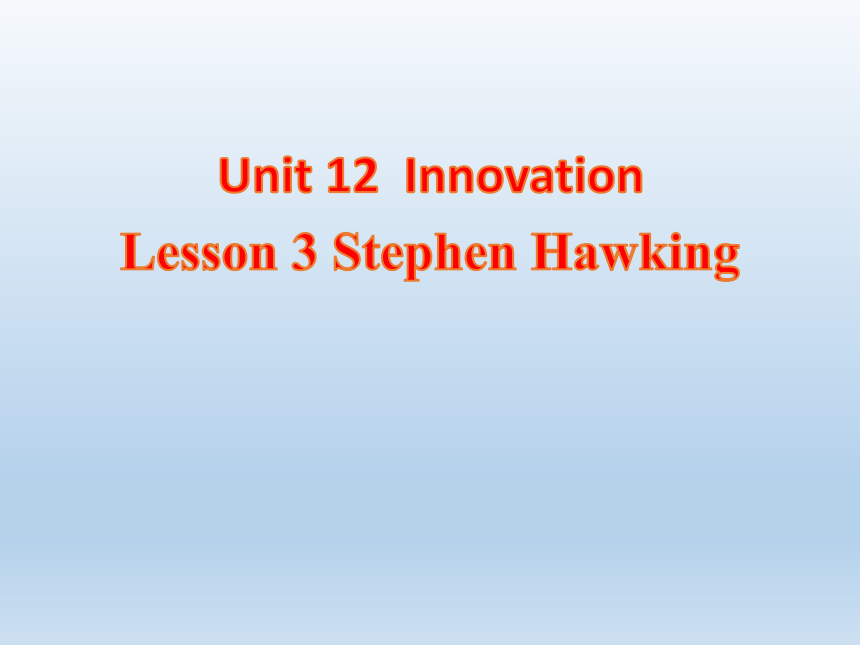
|
|
| 格式 | pptx | ||
| 文件大小 | 845.0KB | ||
| 资源类型 | 教案 | ||
| 版本资源 | 北师大版(2019) | ||
| 科目 | 英语 | ||
| 更新时间 | 2023-03-18 10:45:10 | ||
图片预览


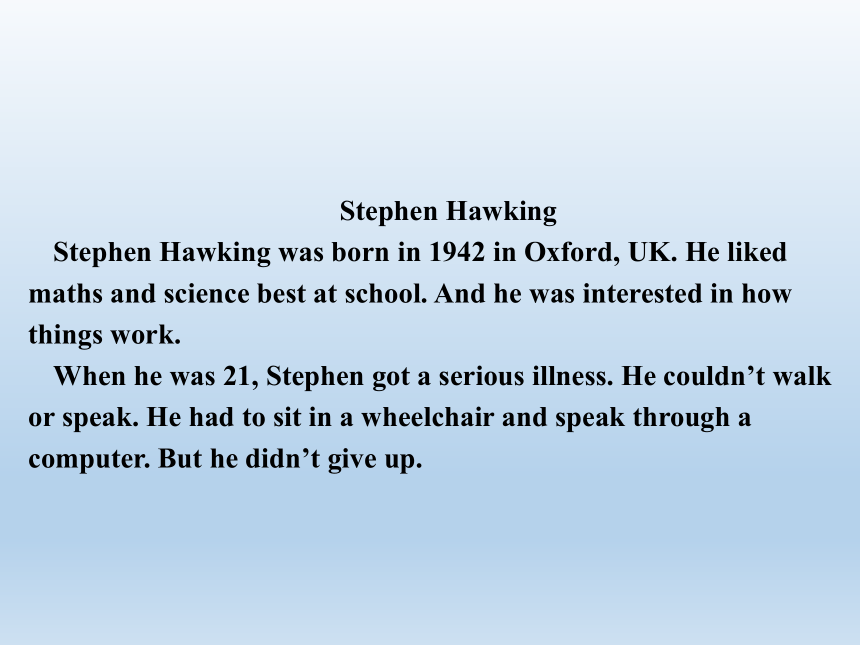
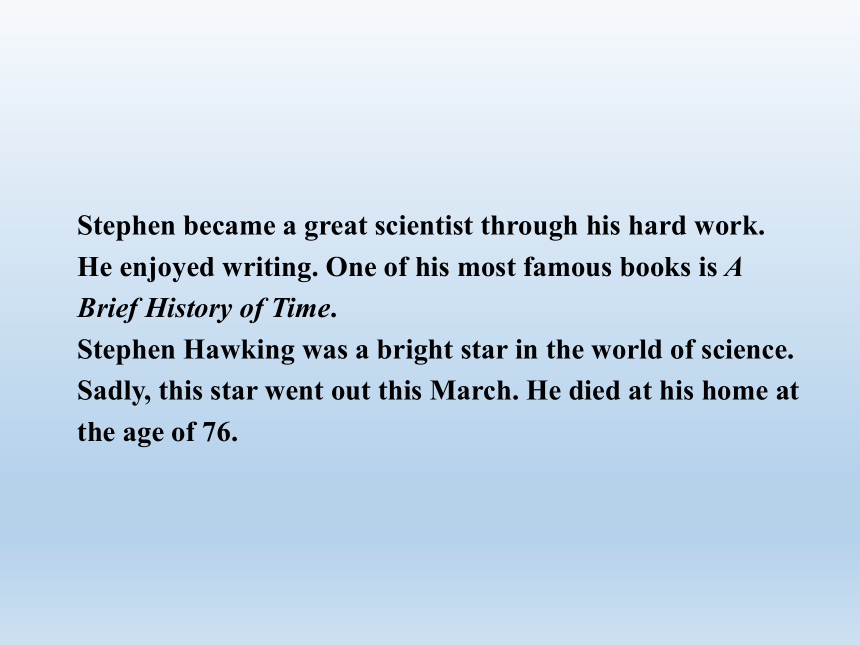
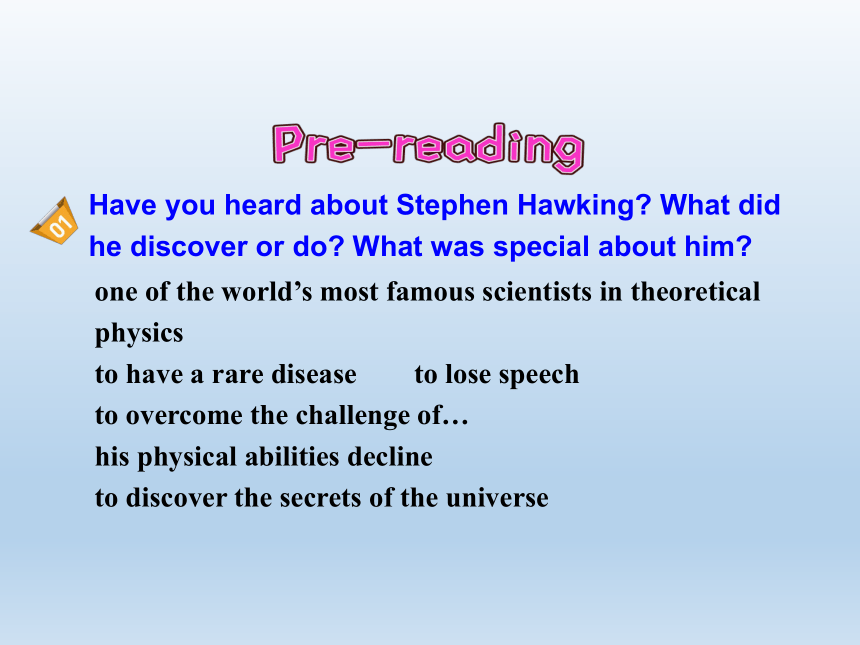
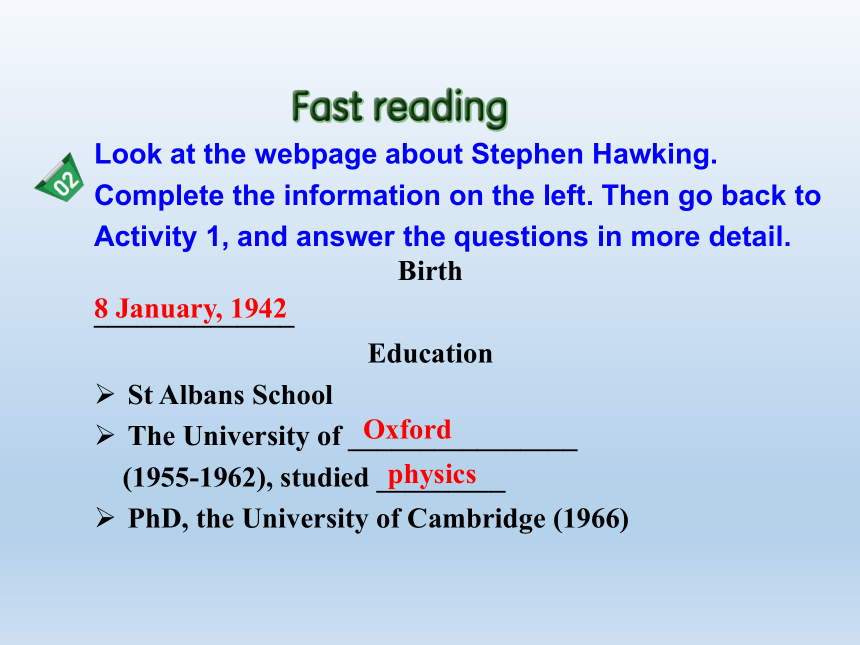
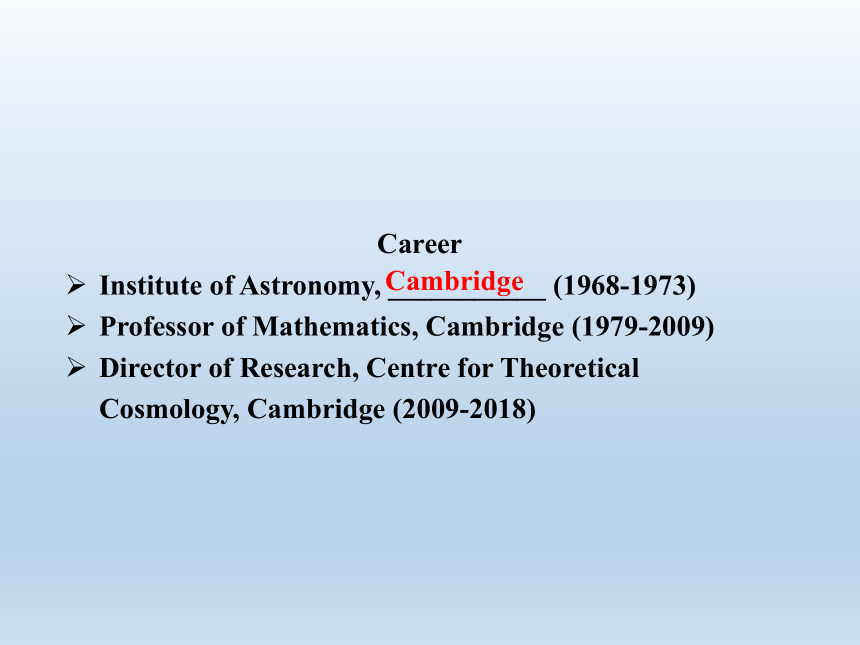
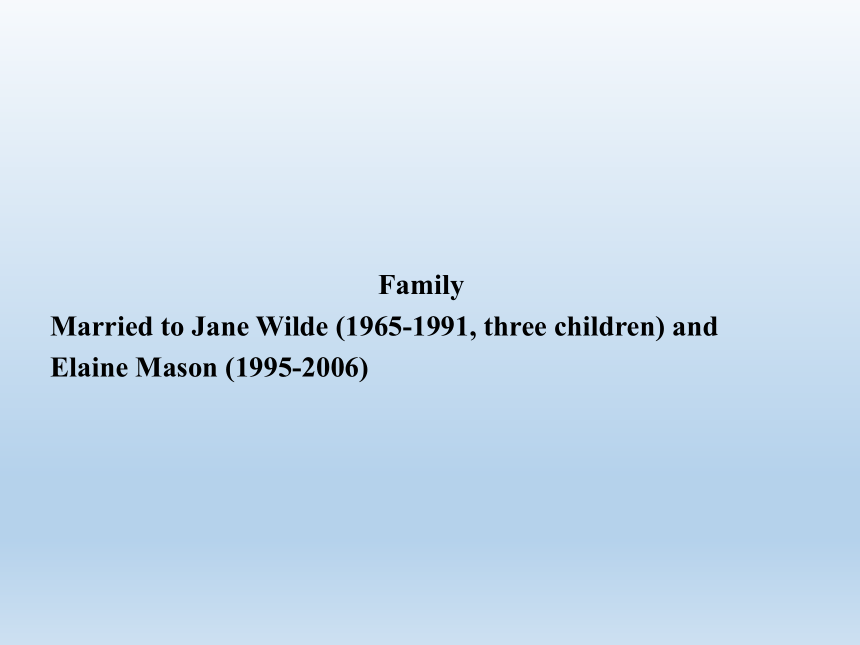
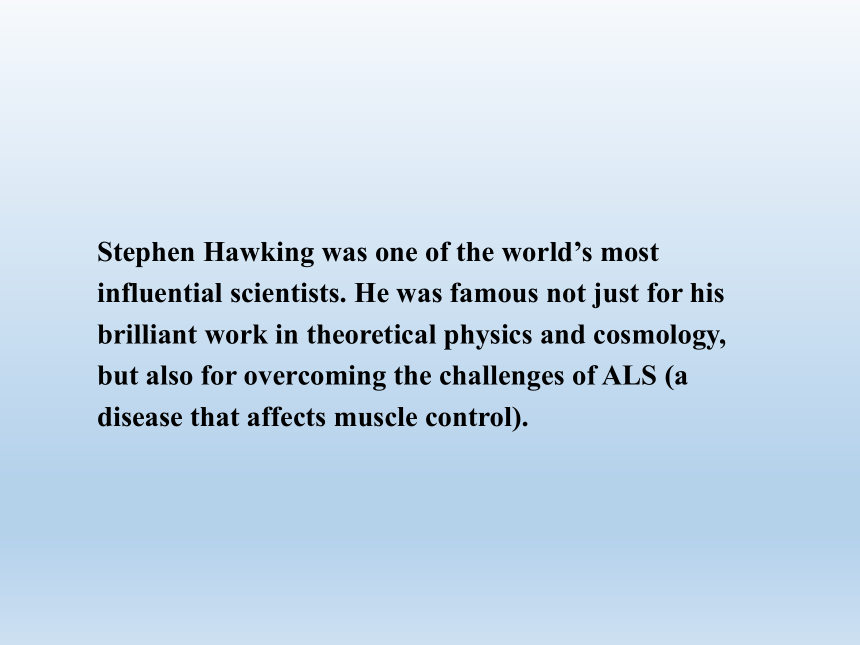
文档简介
(共25张PPT)
Unit 12 Innovation
Lesson 3 Stephen Hawking
Do you know the scientist called Stephen Hawking
Activate and share
Stephen Hawking
Stephen Hawking was born in 1942 in Oxford, UK. He liked maths and science best at school. And he was interested in how things work.
When he was 21, Stephen got a serious illness. He couldn’t walk or speak. He had to sit in a wheelchair and speak through a computer. But he didn’t give up.
Stephen became a great scientist through his hard work. He enjoyed writing. One of his most famous books is A Brief History of Time.
Stephen Hawking was a bright star in the world of science. Sadly, this star went out this March. He died at his home at the age of 76.
Have you heard about Stephen Hawking What did he discover or do What was special about him
one of the world’s most famous scientists in theoretical physics
to have a rare disease to lose speech
to overcome the challenge of…
his physical abilities decline
to discover the secrets of the universe
Look at the webpage about Stephen plete the information on the left. Then go back to Activity 1, and answer the questions in more detail.
Birth
______________
Education
St Albans School
The University of ________________
(1955-1962), studied _________
PhD, the University of Cambridge (1966)
Oxford
8 January, 1942
physics
Career
Institute of Astronomy, ___________ (1968-1973)
Professor of Mathematics, Cambridge (1979-2009)
Director of Research, Centre for Theoretical Cosmology, Cambridge (2009-2018)
Cambridge
Family
Married to Jane Wilde (1965-1991, three children) and Elaine Mason (1995-2006)
Stephen Hawking was one of the world’s most influential scientists. He was famous not just for his brilliant work in theoretical physics and cosmology, but also for overcoming the challenges of ALS (a disease that affects muscle control).
Pair work Read the webpage again. Complete the timeline about Stephen Hawking’s life and work. Then tell each other about him in pairs based on the timeline.
1942
1959
_____
1985
was born
was diagnosed with ALS
1963
went to University of Oxford to study physics
had to have an operation/ lost his speech as a result
1988
2005
2012
2018
died
his book A Brief History of Time: From the Big Bang to Black Holes sold one copy for every 750 people on earth
decided to write a simpler version, A briefer History of Time
said to a TV audience of 900 million people at the opening ceremony of London 2012 Olympics: “Look up at the stars and not down at your feet… be curious.”
Read the webpage again. Ask and answer the questions about Stephen Hawking in pairs.
1. When did he become ill What was the result of his
illness
He was diagnosed with ALS at the age of 21. He was only expected to live for a few years.
2. What did he study What did he find
3. What books did he write What did he argue in the books
He studied black hole.
There was a sort of hole in the centre of a black hole. This hole led to another universe, completely separate from our own.
He wrote From the Big Bang to Black Holes, A Briefer History of Time, The Grand Design.
He argued that we should look for a different way to discover the deepest secrets of the universe.
4. What is a black hole
A black hole is a place in space where gravity is very strong. Anything that falls into it never comes out. Noting can escape from it, not even light. As a result, it is impossible to see a black hole.
Introduce Stephen Hawking based on the diagram.
Stephen Hawking
Attitude towards life
Study
Books
Birth
Education
illness
Think and share.
1. What was Stephen Hawking’s attitude towards life Find
evidence from the webpage.
Hawking had a positive attitude towards life and he never got disappointed or discouraged from his illness.
“Hawking was famous. Not just for his brilliant work in theoretical physics and cosmology, but also …”
“Although Hawking’s physical abilities declined over decades, he never ceased his studies…”
“In spite of his disease, Hawking didn’t consider himself an unlucky man.”
“My expectations were reduced to zero when I was 21. everything since then has been a honus.”
2. What do you think this saying by Stephen Hawking
means: “Look up at the stars and not down at your feet …
be curious.”
It means that we should not focus on our everyday lives and worry too much about unimportant matters. We should think on a larger scale and be curious about nature and the simple things of life.
3. How are the paragraphs on the webpage connected to
each other Find and circle the indicators.
Hawking later found…, although Hawking’s physical…, Hawking also wrote…, In spite of his disease
Complete the summary of Stephen Hawking’s life based on what you have learnt.
Stephen Hawking was born in 1942. he studied at Universities of Oxford and Cambridge, but at the age of 21, he was diagnosed with a serious disease. However, he finished his 1. __________ and got a job at the University of Cambridge and continued his work in 2. __________ physics and 3. __________.
studies
theoretical
cosmology
While his reputation for his work spread, his physical ability 4. _________. In 1985, after an operation, he started to use 5. ___________________________ to help him talk. However, Hawking never ceased his studies and he continued to develop his theories on 6. ___________. Hawking believed that he was not an unlucky person. From his diagnosis at 21 he regarded everything since then as a 7. _________. He was proud of his family and his work, and he appreciated the help that many people had given him.
declined
speech-generating equipment
black holes
bonus
Complete the Word Builder with phrasal prepositions. What other phrasal prepositions do you know
Phrasal Prepositions
1. _______________ 21, when Hawking spent his first
year at the University of Cambridge…
2. His theory was that there was a sort of hole __________
__________ a black hole.
3. _____________ trying to find one big new explanation,
scientists should …
4. _____________ his disease, Hawking didn’t consider
himself an unlucky man.
Word builder
At the age of
in the centre of
Instead of
In spite of
Use the phrasal prepositions below to complete the webpage below on Stephen Hawking.
instead of with the help of
in spite of as a result of
After the Operation
In 1985, Hawking had to have an operation on his throat. 1. ________________ the operation, he couldn’t speak at all. However, 2. ________________ not being able to talk, he was still able to communicate by raising his eyebrows when someone pointed to the right letter on a spelling card.
As a result of
in spite of
instead of with the help of
in spite of as a result of
A computer expert heard of Hawking’s problem and sent him a computer programme. 3. _________________ this programme, Hawking could choose words from a menu on a screen. 4. ______________ pressing a switch in his hand, he could control the programme by making a head or eye movement. At first, he could run the programme on a desktop computer, but then a man called David Mason fitted a small portable computer to his wheelchair.
With the help of
Instead of
Write an essay about Sthphen Hawking.
Unit 12 Innovation
Lesson 3 Stephen Hawking
Do you know the scientist called Stephen Hawking
Activate and share
Stephen Hawking
Stephen Hawking was born in 1942 in Oxford, UK. He liked maths and science best at school. And he was interested in how things work.
When he was 21, Stephen got a serious illness. He couldn’t walk or speak. He had to sit in a wheelchair and speak through a computer. But he didn’t give up.
Stephen became a great scientist through his hard work. He enjoyed writing. One of his most famous books is A Brief History of Time.
Stephen Hawking was a bright star in the world of science. Sadly, this star went out this March. He died at his home at the age of 76.
Have you heard about Stephen Hawking What did he discover or do What was special about him
one of the world’s most famous scientists in theoretical physics
to have a rare disease to lose speech
to overcome the challenge of…
his physical abilities decline
to discover the secrets of the universe
Look at the webpage about Stephen plete the information on the left. Then go back to Activity 1, and answer the questions in more detail.
Birth
______________
Education
St Albans School
The University of ________________
(1955-1962), studied _________
PhD, the University of Cambridge (1966)
Oxford
8 January, 1942
physics
Career
Institute of Astronomy, ___________ (1968-1973)
Professor of Mathematics, Cambridge (1979-2009)
Director of Research, Centre for Theoretical Cosmology, Cambridge (2009-2018)
Cambridge
Family
Married to Jane Wilde (1965-1991, three children) and Elaine Mason (1995-2006)
Stephen Hawking was one of the world’s most influential scientists. He was famous not just for his brilliant work in theoretical physics and cosmology, but also for overcoming the challenges of ALS (a disease that affects muscle control).
Pair work Read the webpage again. Complete the timeline about Stephen Hawking’s life and work. Then tell each other about him in pairs based on the timeline.
1942
1959
_____
1985
was born
was diagnosed with ALS
1963
went to University of Oxford to study physics
had to have an operation/ lost his speech as a result
1988
2005
2012
2018
died
his book A Brief History of Time: From the Big Bang to Black Holes sold one copy for every 750 people on earth
decided to write a simpler version, A briefer History of Time
said to a TV audience of 900 million people at the opening ceremony of London 2012 Olympics: “Look up at the stars and not down at your feet… be curious.”
Read the webpage again. Ask and answer the questions about Stephen Hawking in pairs.
1. When did he become ill What was the result of his
illness
He was diagnosed with ALS at the age of 21. He was only expected to live for a few years.
2. What did he study What did he find
3. What books did he write What did he argue in the books
He studied black hole.
There was a sort of hole in the centre of a black hole. This hole led to another universe, completely separate from our own.
He wrote From the Big Bang to Black Holes, A Briefer History of Time, The Grand Design.
He argued that we should look for a different way to discover the deepest secrets of the universe.
4. What is a black hole
A black hole is a place in space where gravity is very strong. Anything that falls into it never comes out. Noting can escape from it, not even light. As a result, it is impossible to see a black hole.
Introduce Stephen Hawking based on the diagram.
Stephen Hawking
Attitude towards life
Study
Books
Birth
Education
illness
Think and share.
1. What was Stephen Hawking’s attitude towards life Find
evidence from the webpage.
Hawking had a positive attitude towards life and he never got disappointed or discouraged from his illness.
“Hawking was famous. Not just for his brilliant work in theoretical physics and cosmology, but also …”
“Although Hawking’s physical abilities declined over decades, he never ceased his studies…”
“In spite of his disease, Hawking didn’t consider himself an unlucky man.”
“My expectations were reduced to zero when I was 21. everything since then has been a honus.”
2. What do you think this saying by Stephen Hawking
means: “Look up at the stars and not down at your feet …
be curious.”
It means that we should not focus on our everyday lives and worry too much about unimportant matters. We should think on a larger scale and be curious about nature and the simple things of life.
3. How are the paragraphs on the webpage connected to
each other Find and circle the indicators.
Hawking later found…, although Hawking’s physical…, Hawking also wrote…, In spite of his disease
Complete the summary of Stephen Hawking’s life based on what you have learnt.
Stephen Hawking was born in 1942. he studied at Universities of Oxford and Cambridge, but at the age of 21, he was diagnosed with a serious disease. However, he finished his 1. __________ and got a job at the University of Cambridge and continued his work in 2. __________ physics and 3. __________.
studies
theoretical
cosmology
While his reputation for his work spread, his physical ability 4. _________. In 1985, after an operation, he started to use 5. ___________________________ to help him talk. However, Hawking never ceased his studies and he continued to develop his theories on 6. ___________. Hawking believed that he was not an unlucky person. From his diagnosis at 21 he regarded everything since then as a 7. _________. He was proud of his family and his work, and he appreciated the help that many people had given him.
declined
speech-generating equipment
black holes
bonus
Complete the Word Builder with phrasal prepositions. What other phrasal prepositions do you know
Phrasal Prepositions
1. _______________ 21, when Hawking spent his first
year at the University of Cambridge…
2. His theory was that there was a sort of hole __________
__________ a black hole.
3. _____________ trying to find one big new explanation,
scientists should …
4. _____________ his disease, Hawking didn’t consider
himself an unlucky man.
Word builder
At the age of
in the centre of
Instead of
In spite of
Use the phrasal prepositions below to complete the webpage below on Stephen Hawking.
instead of with the help of
in spite of as a result of
After the Operation
In 1985, Hawking had to have an operation on his throat. 1. ________________ the operation, he couldn’t speak at all. However, 2. ________________ not being able to talk, he was still able to communicate by raising his eyebrows when someone pointed to the right letter on a spelling card.
As a result of
in spite of
instead of with the help of
in spite of as a result of
A computer expert heard of Hawking’s problem and sent him a computer programme. 3. _________________ this programme, Hawking could choose words from a menu on a screen. 4. ______________ pressing a switch in his hand, he could control the programme by making a head or eye movement. At first, he could run the programme on a desktop computer, but then a man called David Mason fitted a small portable computer to his wheelchair.
With the help of
Instead of
Write an essay about Sthphen Hawking.
同课章节目录
- Unit 10 Connections
- Lesson 1 How Closely Connected Are We?
- Lesson 2 Community Spirit
- Lesson 3 Anne of Green Gables
- Unit 11 Conflict And Compromise
- Lesson 1 Living In a Community
- Lesson 2 Dealing with Conflict
- Lesson 3 War Memories
- Unit 12 Innovation
- Lesson 1 Scientific Breakthroughs
- Lesson 2 Aha Moment
- Lesson 3 Stephen Hawking
